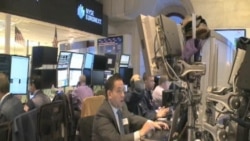NEW YORK —
In New York, investors mostly cheered the last minute U.S. budget agreement that averted a possible default on the national debt, but some economists remain concerned about the country's long-term fiscal health; the long political impasse may have shaken consumer and investor confidence and the deal only postpones legislative action to reduce the national debt.
This ongoing uncertainty hurts businesses like Studley Incorporated, a commercial real estate firm that manages some well-known properties, including the Time Warner Center in New York City. Heidi Learner, chief economist at Studley, said their clients and the markets need consistent economic polices in place to invest in long-term projects.
“I think that is what the markets are craving, is that long-term stability and the certainty that comes with knowing we have a budget, at least through the current fiscal year, that allows us to know that the Treasury isn't going to be facing a debt ceiling say every three or four months,” said Learner.
John Glynn, managing director of the investment brokerage firm Drexel Hamilton, claims the unresolved budget battles could reduce consumer confidence, which would affect the automotive industry and retailers.
“I think people are going to be a little reluctant because they have just gone through something, they think they might have to go through it again in three months, and they might be a little bit cautious with their spending,” said Glynn.
Harry Smith, Senior Vice President at Drexel Hamilton, pointed out that a lack of confidence in government and slow economic growth could also mean fewer jobs in the near future.
“The factors that we can’t quantify, like employee attitudes or employer attitudes, looking forward do they really want to hire, do they really want to add people to staff when we are not really sure where we stand with the government because we are going to be in this situation in three and one half months,” said Smith.
While the budget deal averted some immediate economic problems, it is not enough to put the country on a path to long-term robust economic growth.
This ongoing uncertainty hurts businesses like Studley Incorporated, a commercial real estate firm that manages some well-known properties, including the Time Warner Center in New York City. Heidi Learner, chief economist at Studley, said their clients and the markets need consistent economic polices in place to invest in long-term projects.
“I think that is what the markets are craving, is that long-term stability and the certainty that comes with knowing we have a budget, at least through the current fiscal year, that allows us to know that the Treasury isn't going to be facing a debt ceiling say every three or four months,” said Learner.
John Glynn, managing director of the investment brokerage firm Drexel Hamilton, claims the unresolved budget battles could reduce consumer confidence, which would affect the automotive industry and retailers.
“I think people are going to be a little reluctant because they have just gone through something, they think they might have to go through it again in three months, and they might be a little bit cautious with their spending,” said Glynn.
Harry Smith, Senior Vice President at Drexel Hamilton, pointed out that a lack of confidence in government and slow economic growth could also mean fewer jobs in the near future.
“The factors that we can’t quantify, like employee attitudes or employer attitudes, looking forward do they really want to hire, do they really want to add people to staff when we are not really sure where we stand with the government because we are going to be in this situation in three and one half months,” said Smith.
While the budget deal averted some immediate economic problems, it is not enough to put the country on a path to long-term robust economic growth.






